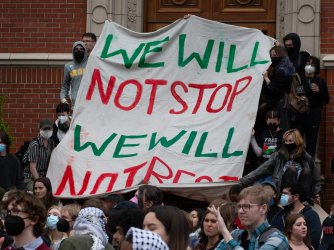Table of Contents
The War on Christians (and Muslims)
There has been a lot of talk the past few months about the “war on Christmas,” by which people generally mean the replacement of the religious symbols and language of Christmas with secular language and symbols of the holidays. This is often extended into an argument that there is a growing cultural hostility to the public observance of religion in general and Christianity in particular. It’s not in FIRE’s mission to address these issues with regard to society in general—we leave that to the dozens of groups and thousands of individuals who engage in extended disputes about this every year—but we can comment on our experience in working for religious liberty on college campuses. And unfortunately, in 2005 we were once again reminded of the sorry shape of religious liberty at America’s colleges and universities.
From the University of North Carolina-Chapel Hill, to the University of Wisconsin-Eau Claire, to California State University-San Bernardino and more, 2005 saw a continuance of attacks on the rights of religious groups at public universities to select their own leaders and members according to religious criteria. A lot of the confusion has stemmed from a false and possibly malicious conflation of “belief” with “status.” To be more specific, universities will often claim that groups may choose members based on shared beliefs (such as the holding of the set of beliefs that makes someone Christian or a Muslim—the two groups that most often face trouble on campus) but that they may not choose people bases on their religious status (such as being a Christian or Muslim). This, of course, makes no sense at all, since the essence of holding the “status” of being Christian or Muslim is holding a certain set of beliefs. When it comes to those two religions, along with many others, belief is status and vice versa.
Getting this belief/status distinction across to universities would save religious groups—and FIRE—a lot of time and effort. After all, when universities like UNC try to advance these incoherent arguments in court, they lose. But just because courts recognize the rights of religious groups at public universities does not mean that religious liberty is safe. Religious students simply should not have to justify themselves in court in a way that secular groups such as College Republican chapters or golf clubs don’t. Until America’s public colleges and universities come to recognize this and decide to treat their students equally regardless of their religious beliefs or lack thereof, FIRE will continue to fight this battle.
Recent Articles
FIRE’s award-winning Newsdesk covers the free speech news you need to stay informed.

How court rulings in Hong Kong and Australia threaten the global internet

Another Connecticut town tramples Constitution with onerous town green rules

Majority of college students support Israel/Gaza campus protests, 1 in 10 actually participate in them
